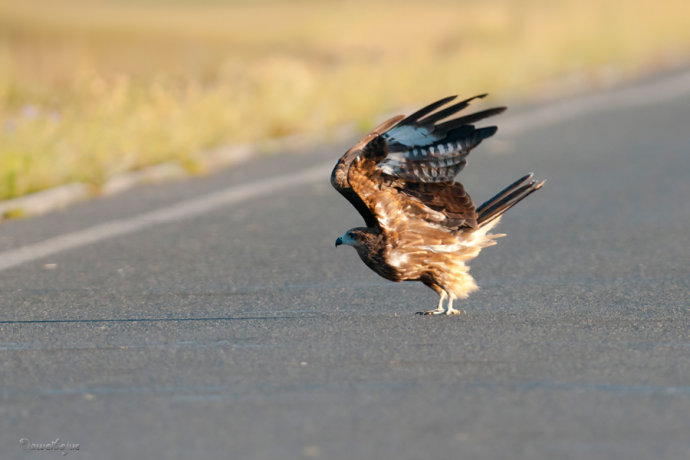(单词翻译:单击)
听力文本
This is Scientific American — 60-Second Science. I'm Jason Goldman.
[Songbird and traffic noise]
It's hard to be a bird in our human-dominated world.
You can barely hear yourself sing, let alone hear the songs of your friends... and you can forget about hearing a predator. Noise is almost everywhere. Especially noise from traffic. A whopping 83 percent of the surface of the continental U.S. is within just one kilometer of a road.
Researchers have tried to assess the impact of road noise on animals by, understandably, looking at animals living near noisy roads. The problem is that noisy roads are both noisy, and well, they're roads. It's hard to separate the two.
"And so we figured out a way to have just the noise without any of the other effects of the road, and to do that we ran speakers through a forest where there was no road."
Chris McClure, a biologist at Boise State University and The Peregrine Fund. He and his team built their audio phantom road at a popular stopover site for birds in Idaho as they fly south for the winter.

While the noise kept lots of birds away, some stuck around. But they had trouble putting on enough weight to fuel the next leg of their migratory journey.
"They have to fatten up but they also have to not get eaten by a predator. And those two things are in conflict. Because to eat, they have to look down, which means they aren't looking at predators."
And when it's too loud, they can't hear the alarm calls of other birds. So they have to waste time looking for predators instead of foraging. The study is in the journal Animal Conservation.
By 2050, it's thought that enough new roads will be built to circle the planet more than 600 times. But there's an easy solution to the noise problem.
"Lowering speed limits does a lot."
So next time you're driving through nature, just slow down a little. It's safer for you and the wildlife. And you can enjoy the view a little longer.
Thanks for listening for Scientific American — 60-Second Science Science. I'm Jason Goldman.
参考译文
这里是科学美国人——60秒科学。我是杰森·古德曼。
在我们人类主宰的世界里,鸟类的生存很艰难。
你几乎听不到自己唱歌,更别提你朋友们的歌声了……你也可能会忘掉听到的捕食者的声音。因为噪音无处不在。尤其是交通嗓音。高达83%的美国大陆表面仅仅有一公里的路。
研究人员试图评估道路噪音对动物的影响,可想而知,他们的方法就是观察生活在嘈杂道路附近的动物。问题是,嘈杂的道路虽然十分吵闹,但同时也是道路。所以很难把道路与噪音区分开。
“因此,我们想出了一个方法只测试噪音的影响,而不受道路的影响,为了做到这一点,我们把扬声器铺满没有道路的树林。”
克里斯·麦克卢尔是来自博伊西州立大学和游隼基金会的生物学家。他和他的团队在爱达荷州一个鸟类喜欢的停留地建立了“声音幽灵路”,鸟类在飞往南方过冬时喜欢停留在那里。
虽然噪音使很多鸟远离这里,但是也有一些仍然逗留在附近。不过,由于它们无法增加足够的体重,所以它们没有动力飞到迁徙途中的下一个停留地。
“它们必须要吃东西,可是它们也要小心不被捕食者吃掉。这两者相互矛盾。因为,要吃东西,它们就必须低头觅食,可是这样一来它们就不能观察捕食者了。”
当嗓音过大时,它们听不到其他鸟类发出的警报声。所以,它们必须花时间寻找捕食者,这样它们就不能觅食。这项研究发表在《动物保护》期刊上。
预计到2050,新建道路可绕地球超过600次。但是却没有简单的方法能解决噪音问题。
“降速限制可以降低噪音。”
所以,下一次你开车穿过大自然时,可以把速度放慢点儿。这样做对你和野生动物来说更加安全。而且你也有更多的时间可以享受美景。
谢谢大家收听科学美国人——60秒科学。我是杰森·古德曼。
译文为可可英语翻译,未经授权请勿转载!
重点讲解
重点讲解:
1. let alone (通常用在否定句后)遑论,更别提,更不用说;
例句:They had never seen such massive equipment, let alone made.
这样的大设备他们看都没看过,更不用说制造了。
2. figure out 想出;理解;弄清;
例句:We must figure out how to do it.
我们必须想出做这件事的办法。
3. stick around 呆在原处(等待);
例句:Stick around a while and see what develops.
呆上一会儿,看看会发生什么。
4. instead of 代替…;而不是…;
例句:I have to finish my work instead of going out.
我必须完成工作,不能外出。
5. slow down (使)放慢;(使)减速;
例句:When the light is yellow, you should slow down.
灯变黄色时,你应该减速。


